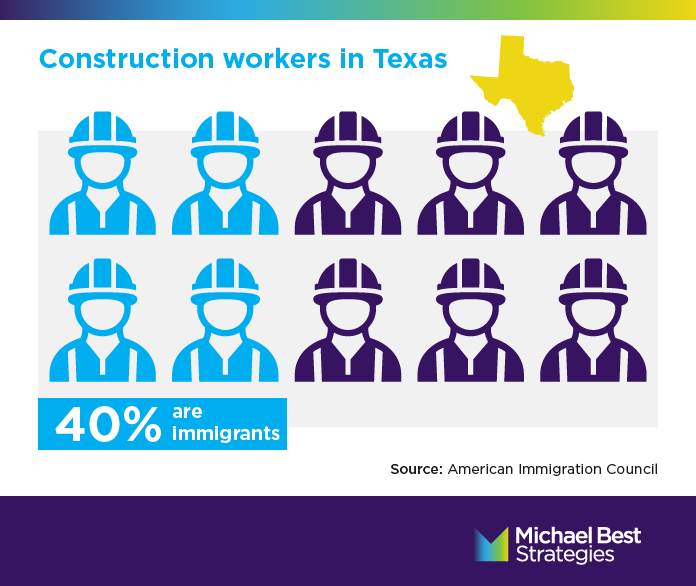
Now that border wall advocates have failed in their attempts to negotiate border wall funding out of a Democrat controlled Congress, President Trump last week declared a national emergency to secure the border. As expected, the declaration resulted almost immediately in litigation from interested parties who challenge the President’s ability to declare a national emergency for such a purpose.
While the constitutionality of the President’s declaration makes its way through the courts, pro-border wall advocates are blaming Republican Congressional leadership for failure to act when Republicans controlled both chambers. What these advocates fail to recognize is that, while technically Republicans controlled both chambers, their margin in the Senate was too narrow to pass anything that was remotely controversial within the party, including a border wall. Their coalition of 51 Senators included a few outspoken opponents who might support enhanced security but not in the form of a wall.
To understand the complexity of this issue, many are looking to Texas, whose border with Mexico is approximately 1,200 miles long, equaling about half of the entire US-Mexico border. It stretches through both urban centers, such as El Paso, and rural ground. The border represents a complicated relationship between this state and its neighboring country.
Mexico is Texas’s number one trading partner, with the state exporting $97 billion and importing $89 billion in goods each year. With low unemployment, many Texas industries rely on immigration labor.

Texas was, at one time, part of Mexico, and many of the state’s residents are descendants of families who fought for Texas’s independence from Mexico. It’s not uncommon for families to live in different countries, but only a few miles apart.
Because of this unique relationship, the subject of a wall is a delicate one that affects private property rights, law enforcement, labor, education and health care. And the political lines are not clearly drawn.
Here’s a snapshot of what some of the state’s opinion leaders are saying about President Trump’s proposed border wall.
The South Texas Property Rights Association supports a border wall, except through rural areas. The members of this group might be most directly affected by wall, as their properties are the ones that literally border Mexico. Immigrants make their way through these properties, which would be taken for border wall construction.
Border Patrol Rio Grande Valley @BorderPatrolRGV, shared a retweet “During the 35-day shutdown, Border Patrol agents in the #RGV apprehended nearly 17,000 undocumented immigrants, seized more than 15,000 pounds of marijuana and nearly 900 pounds of cocaine. They also raided 19 stash houses. #RGV #BorderNews #BorderSecurity #Shutdown #BorderPatrol.”
U.S. Senator Ted Cruz, a conservative firebrand, not only supports a border wall, but introduced the WALL Act in December, which would have appropriated $25 billion for the project.
“I have long called for building a wall as a necessary step in defending our border and stopping the flow of illegal immigration into our country…the overwhelming majority of Texans and Americans want to see the border secured. The WALL Act would fully fund the border wall by closing existing loopholes that provide illegal immigrants with federal benefits and tax credits, without affecting the benefits and tax credits used by Americans.” – Senator Ted Cruz
U.S. Senator John Cornyn, the state’s senior Senator, proposes a combination of a physical wall in geographies where it makes sense and technological barriers in rural areas, where building a wall would disturb the environment and take land from ranchers.
“I’ve always believed [the solution] was a combination of physical barriers in hard to control areas, particularly urban areas where a quick dash across the border can mean success [illegally reaching the United States]…But many of our challenges have to have a technology base, radar, ground censors [sic]…you name it, then of course the personnel…” – Senator John Cornyn
Congressman Will Hurd, whose district includes more than half of the Texas-Mexico border, endorses the use of technology as opposed to a physical wall. Hurd maintains that fiber optic cables would not only be more cost efficient but also more effective.
Congressman Henry Cueller, who is a Democrat but has been named the most bipartisan member of Congress, and whose district also includes the border, agrees that border security is important but, like Hurd, endorses the use of technology for that purpose.
Texas Lt. Governor Dan Patrick, a vocal proponent for the wall, even offered to use state money to build one, with reimbursement coming from the federal government. Republican Governor Greg Abbott is a bit skeptical about that proposal.
“It’s a hypothetical with no conclusion because the federal government is not stepping up and funding border security and so it’s a circular argument because we’re all just waiting around for the federal government and Congress to do its job, to appropriate funding, to secure our border and our state,” Abbott told KENS, the CBS affiliate in San Antonio.” – Lt. Governor Dan Patrick
How much taxpayers pay to support illegal immigration is a very political question, and the answer depends on who you ask. Anti-immigration groups cite numbers as high as $11 billion/year, while other studies point to immigrants’ contributions to the workforce, tax base and multi-generational contributions as offsetting the initial cost of education and social support.
And consistent with the opinions of lawmakers, Texans as a whole are divided on the issue, with polls showing conflicting survey results.
In April 2018, a Texas Lyceum poll reported that 61% of Texans oppose the construction of a physical wall, but a February 2018 CBS poll shows that 56% of Texans support “enhanced border security”. That same poll shows that Texans have compassion towards those already here, with a majority of Texas supporting a path to citizenship in some cases.





